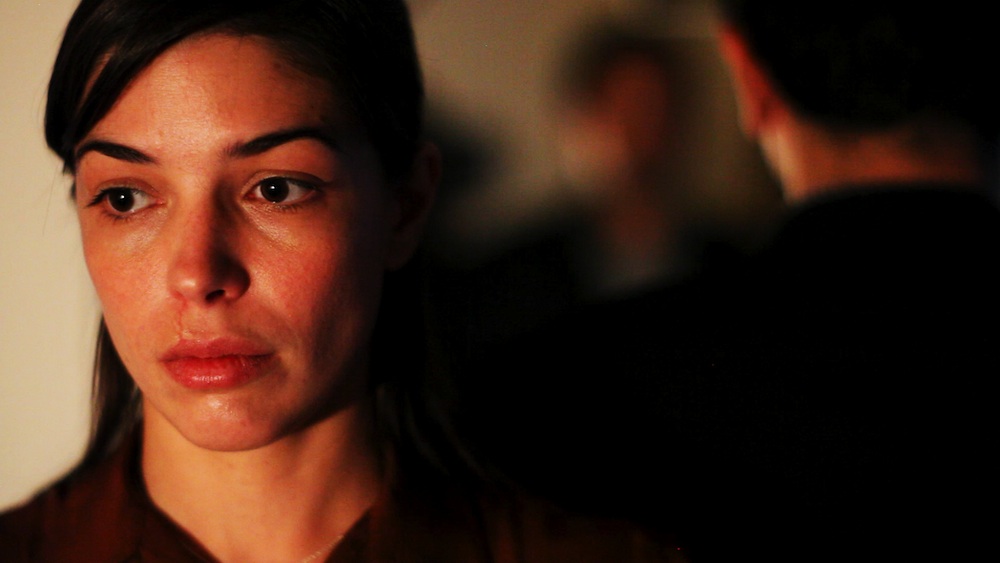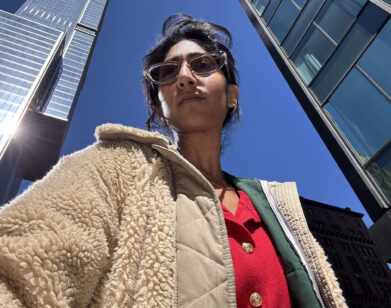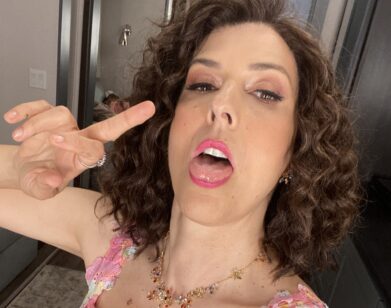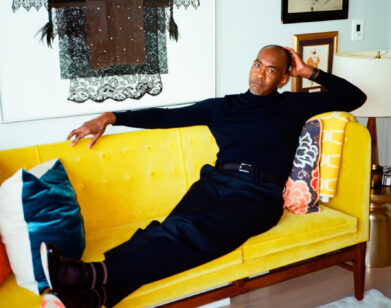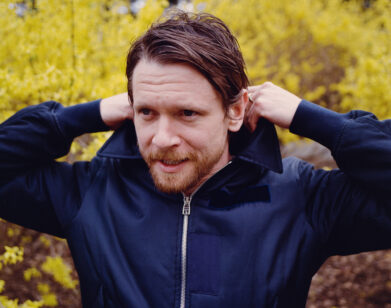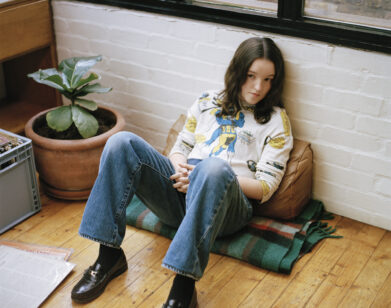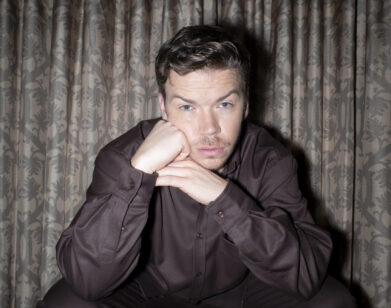Three Dimensions of Héloïse Godet
At first viewing, Goodbye to Language, the latest film from 83-year-old New Wave maverick and provocateur Jean-Luc Godard, is one of those films you don’t quite know what to do with. It’s more energy than narrative. Filmed in 3-D, and separated in sections “Nature” and “Metaphor,” multi-layered fragmented images and text float by, interspersed with newsreels and domestic scenes. Music swells. A gun is fired. Autumn leaves float on water. A single man and a married woman meet, then meet again, perhaps as different people, and discuss love and philsophy while nude. Appropriated texts, from a long list that includes Proust and Aleksandr Solzhenitsyn, are spoken. A dog, Godard’s own shepherd mix, credited as Roxy Miéville, scampers between city and country. Ultimately, Goodbye to Language serves as a gorgeous, soaring vehicle for Godard to unspool his current meditations on some his major preoccupations: Language, cinema, politics, and culture.
French newcomer Héloïse Godet stars as Josette, the married woman who begins an affair with the single man, Gédéon (Kamel Abdeli). Another actress named Zoé Bruneau steps in for a portion of the film as Godet’s doppelganger. Interview caught up with Godet when she was in town last month for the New York Film Festival.
COLLEEN KELSEY: What was the first Godard film you saw, or the first time you encountered his work?
HÉLOÏSE GODET: It’s difficult to say, because in France, he’s so famous that a lot of his first movies were always playing on TV. I don’t remember which one was the first, but it could be Contempt [1963]. The first time I saw it; it was way too early to see it. I was way too young to understand love; I saw it a couple of years ago and I adored it.
I’ve admired him forever, so I was really full of respect and joy to be able to meet him. The legend is that it’s really difficult to have a normal conversation with him, but it actually went pretty well and normal; I wouldn’t say casual because it was full of protocols. I read a big biography about him so I would be prepared.
KELSEY: When did you start acting?
GODET: My mother was an actress and theater teacher. She’s never tried to be famous but she’s always had theater companies. At the beginning it was more like, “Can you help? Can you do these parts?” After that, it just became more and more enjoyable.
At the beginning I thought it was real. I saw my mom in Salome by Oscar Wilde. I was kind of shocked; my dad was sitting next to me…I was thinking like, “How can you stand my mom to be with a guy?” I thought it was really weird. My dad was really proud and loving my mom even more after that. [laughs]
KELSEY: How did you first get involved with this film? Was it a proper audition?
GODET: He saw a picture of me on the web on a casting site. He saw my picture and wanted his assistant to meet with me. So there was a first interview filmed with his assistant—45 minutes, quick, a video and just talking about life. Simple. Then he changed his mind and he was in New York meeting with Swiss actors. I was devastated. Then it turned out not to be good with the Swiss actors, so he wanted to meet me again. He has one page of text and one page of images. He told me, “Ah, that’s great because you’re watching the images more than the text.”
He wanted to see if I knew how to act normally without putting too much in it. That was enough. I remember shaking hands and he was like, “Do you have hair?” What? [laughs] “Yeah, I want women to have hair because you’re going to be naked. Are you okay with being naked?” Oh yeah, yeah, yeah. I mean, you’re Jean Godard. I can do it.
KELSEY: Did he explain the concept of the film to you? Or was it something that was more instinctual coming from your end with the script?
GODET: Every time I wanted to ask questions, he was really mysterious. At the beginning of filming, he said, “You have questions? No. You won’t.” The first day. [laughs] So, he wasn’t really willing to explain.
KELSEY: How did you see it?
GODET: I did research in the subtext, trying to find out where he was coming from, but it didn’t really give me clues.
KELSEY: How many times have you seen the film?
GODET: Three times. And I would love to see a couple of hundreds of times more. [laughs] I get really emotional when I see it. It’s not because it’s me in the movie. It gets really intense. The first time, I cried. The music, the editing, the 3D, the surprising humor…Some people see it as desperate. I don’t see it like that. To me it’s an intimate movie.
KELSEY: How did you approach the relationship dynamic between your character and her boyfriend?
GODET: Tension, basically. It could have been more tension but I felt that Godard didn’t want to go to that point in the script where I had to kill him or stab him. I think in the other part, she stabs him. Where I had to do it, it was just a little bit of despise and seduction. He loved that we really were playing them normal and not trying to act anything, playing at degree zero of language, trying to be really direct. That was kind of enjoyable. At the end [the boyfriend character] is lying on the floor and says he’s dying and I’m just saying, “Let him die!” [laughs]
KELSEY: I interpreted them as stand-in archetypes of “man” and “woman.” I’m not sure if anyone else agrees. But I have to ask you about Roxy, the dog. Certain scenes in your part are supposed to be filmed from Roxy’s point of view. Was Roxy on set?
GODET: I would have loved it, but we never met. She’s the star. [laughs] It was crazy. We were supposed to meet on a Monday. And then Godard said, “No. Roxy’s not feeling well. Roxy’s not in the mood. She’ll be afraid.” I’m just a human being on the set. She had her shoot way before. That’s a really intimate thing. It’s a movie, but you have think about his solitude—about his way of seeing the world through his dog’s eyes. That’s why I think it’s pretty optimistic. At the end, you get the baby crying at the same time as the dog. It’s funny because I found out about my baby just after the last text we did last November. I was pregnant but I didn’t know it. It was something like the end of the movie, beginning of my movie. A nice continuity.
GOODBYE TO LANGUAGE IS OUT IN LIMITED RELEASE AT IFC CENTER AND FILM SOCIETY AT LINCOLN CENTER IN NEW YORK.

